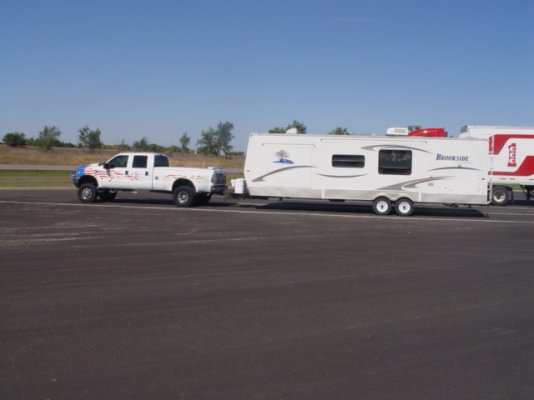COTraveler
Member
- Joined
- Jun 17, 2016
- Posts
- 9
Hi everyone,
My wife and I are planning to full-time in an RV for a couple of years before we settle down to start a family. Because we just recently purchased a 2015 F150, we're looking into travel trailers that are large enough for full-time living, yet light enough to pull behind our truck. Any thoughts or opinions on the below setup (which we're still looking at) would be most appreciated!
Tow Vehicle:
2015 F150 S-Crew 3.5L EcoBoost
Rated towing capacity = 10,700 pounds
Payload = 1900 pounds
Rear GAWR = 3800 pounds
Estimated passenger and cargo weight in truck = 500 pounds
Hensley Anti-Sway Hitch weight = 190 pounds
Travel Trailer in Consideration:
2016 Dutchmen Kodiak 291RELS
GVWR = 8900 pounds
Tongue weight at 15% of GVWR = 1335
Length = 32'4"
My biggest concern with this setup is the payload limit on the truck. By the time you factor truck cargo/passenger weights and the Hensley hitch weight, we're at 690 pounds. Then, add the weight of the fully loaded trailer tongue and we're at 2025 pounds. Even if we don't fully load the trailer, we're still right at the maximum payload rating. If we didn't already own a truck, then I'd be looking for an F250 with a 3000+ payload to handle the load, but...
Does anyone have experience with this type of setup? If so, how did you maintain your payload rating on your truck? Thanks in advance!
-Scott
My wife and I are planning to full-time in an RV for a couple of years before we settle down to start a family. Because we just recently purchased a 2015 F150, we're looking into travel trailers that are large enough for full-time living, yet light enough to pull behind our truck. Any thoughts or opinions on the below setup (which we're still looking at) would be most appreciated!
Tow Vehicle:
2015 F150 S-Crew 3.5L EcoBoost
Rated towing capacity = 10,700 pounds
Payload = 1900 pounds
Rear GAWR = 3800 pounds
Estimated passenger and cargo weight in truck = 500 pounds
Hensley Anti-Sway Hitch weight = 190 pounds
Travel Trailer in Consideration:
2016 Dutchmen Kodiak 291RELS
GVWR = 8900 pounds
Tongue weight at 15% of GVWR = 1335
Length = 32'4"
My biggest concern with this setup is the payload limit on the truck. By the time you factor truck cargo/passenger weights and the Hensley hitch weight, we're at 690 pounds. Then, add the weight of the fully loaded trailer tongue and we're at 2025 pounds. Even if we don't fully load the trailer, we're still right at the maximum payload rating. If we didn't already own a truck, then I'd be looking for an F250 with a 3000+ payload to handle the load, but...
Does anyone have experience with this type of setup? If so, how did you maintain your payload rating on your truck? Thanks in advance!
-Scott

